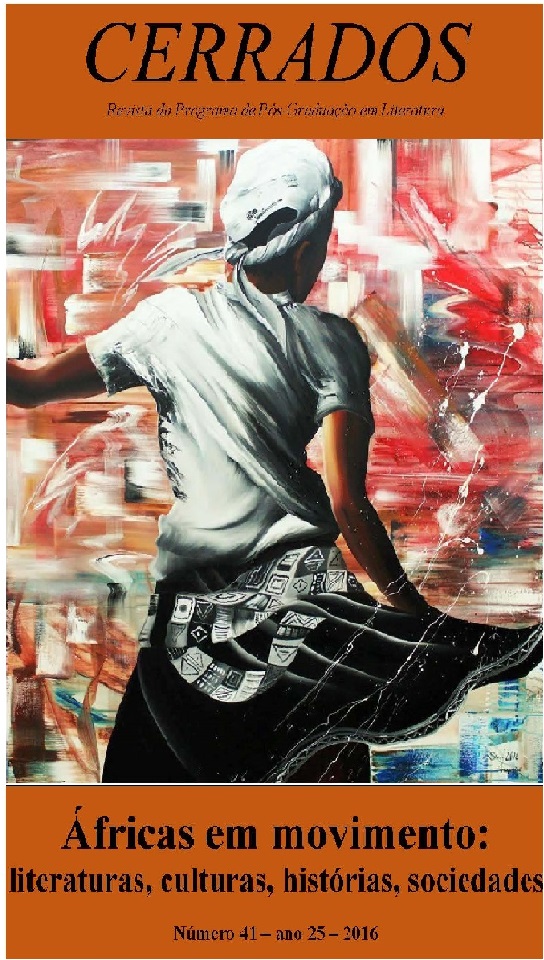WRITING A LIBERATING STORY WITHIN THE TUMULT OF MODERNITY: GERMANO ALMEIDA’S IMPOSSIBLE CHALLENGE
Keywords:
Historiography. Metafiction. Postmodernism.Abstract
This article explores the tension in Germano Almeida’s novels between the desire to depict the experience of Cape Verde history and the aspiration to write within the aesthetic norms of contemporary world literature. This study is based on an analysis of A Morte do Ouvidor. In this novel, Almeida focuses on the 18th-century event in Ribeira Grande to which the title refers. We hope to show that despite his fractured narrative style, Almeida seeks to participate in shaping the identity of a country that is compelled, due to its insufficient economic resources, to define its place in today’s globalised society.
Downloads
References
ALMEIDA, Germano. A morte do Ouvidor. Lisboa: Caminho, 2010.
”“”“”“”“”“. Eva. Lisboa: Caminho, 2006.
”“”“”“”“”“. Estórias contadas. Lisboa: Caminho, 1998.
”“”“”“”“”“. Os dois irmãos. Lisboa: Caminho, 1995.
BARTHES, Roland. . Le degré zéro de l’écriture. Paris: Seuil, 1972 (Coleção Points).
BERNABÉ, Jean et alii . L’éloge de la créolité. Paris: Gallimard, 1989.
CABRAL, Iva. António de Barros Bezerra de Oliveira, o Régulo da Ilha de Santiago. Portal do Conhecimento de Cabo Verde. Disponível em:
<http://hdl.handle.net/10961/362>. Acesso em: 25/02/2016.
DERRIDA, Jacques. Sauf le nom. Paris: Galilée, 1993.
”“”“”“”“”“. Mal d’archive: une impression freudienne. Paris: Galilée, 1995.
ECO, Umberto. Apostille au Nom de la rose. Paris: Grasset, 1985 (Coleção Biblio/Essais).
FARGE, Arlette. Le Goût de l’archive, n. 233. Paris: Seuil, 1989 (Coleção Points Histoire).
GENETTE, Gérard. Frontières du récit. Figures II. Paris: Seuil, 1979. p. 49-70 (Coleção Points Essais).
GLISSANT, Édouard. Le discours antillais. Paris: Gallimard,1997 [1981] (Coleção Folio Essais).
HUTCHEON, Linda. A poetics of Modernism: history, theory, fiction. New York: Routledge, 1988.
LUKACS, Georg. Le roman historique. Trad. Robert Sailley. Paris: Editions Payot, 2000.
NORA, Perre . Mémoire collective. In: LE GOFF, Jacques et alii (Dir.). La nouvelle histoire. Paris: Retz, 1978. p. 398-401.
”“”“”“”“”“. Les lieux de mémoires. Paris: Gallimard, 1997.
RANCIERE, Jacques. Les noms de l’histoire: essai de poétique du savoir. Paris: Seuil, 1992.
RATTNER, Jair. “Os portugueses acham que são donos da língua”, Germano Almeida, escritor cabo-verdiano. Pessoa, revista de literatura lusófona, 6 de agosto de 2010. Disponível em: <http://www.revistapessoa.com/2010/08/os-portugueses-acham-que-sao-donos-da-lingua-germano-almeida-escritor-cabo-verdiano/>. Acesso em: 25 fev.2015.
RICOEUR, Paul. Temps et récit, 1: L’intrigue et le récit historique. Paris: Seuil, 1983 (Coleção Points Essais).
”“”“”“”“”“. Temps et récit 3: Le temps raconté. Paris: Seuil, 1985 (Coleção Points Essais).
RYAN-SAUTOUR, Michelle. La métafiction postmoderne. In: LEPALUDIER, Laurent (Dir.). Métatextualité et métafiction: théorie et analyse. Rennes: Presses Universitaires de Rennes, 2002. p. 69-78.
WAUGH, Patricia. Metafiction: the theory and practice of self-conscious fiction. Londres: Taylor & Francis e-Library, 2001
Published
How to Cite
Issue
Section
License
Proibida a reprodução parcial ou integral desta obra, por qualquer meio eletrônico, mecânico, inclusive por processo xerográfico, sem permissão expressa do editor (Lei n. 9.610 de 19/2/1998 )



